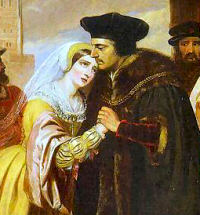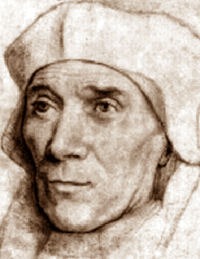St. Thomas More
St. Thomas More
 His belief that no lay ruler has jurisdiction over the church of Christ cost Thomas More his life.
His belief that no lay ruler has jurisdiction over the church of Christ cost Thomas More his life.
Beheaded on Tower Hill, London, July 6, 1535, he steadfastly refused to approve Henry VIII’s divorce and remarriage and establishment of the Church of England.
Described as “a man for all seasons,” More was a literary scholar, eminent lawyer, gentleman, father of four children and chancellor of England. An intensely spiritual man, he would not support the king’s divorce from Catherine of Aragon in order to marry Anne Boleyn. Nor would he acknowledge Henry as supreme head of the church in England, breaking with Rome and denying the pope as head.
More was committed to the Tower of London to await trial for treason: not swearing to the Act of Succession and the Oath of Supremacy. Upon conviction, More declared he had all the councils of Christendom and not just the council of one realm to support him in the decision of his conscience.
Four hundred years later, in 1935, Thomas More was canonized a saint of God. Few saints are more relevant to our time. In fact, in 2000, Pope John Paul II named him patron of political leaders. The supreme diplomat and counselor, Thomas More did not compromise his own moral values in order to please the king, knowing that true allegiance to authority is not blind acceptance of everything that authority wants. Henry himself realized this and tried desperately to win his chancellor to his side because he knew More was a man whose approval counted, a man whose personal integrity no one questioned. But when Thomas resigned as chancellor, unable to approve the two matters that meant most to Henry, the king felt he had to get rid of Thomas.
Excerpted from Saint of the Day, Leonard Foley, O.F.M.
Patron: Declared in 2000 by St. John Paul II patron of statesmen and politicians; Adopted children; diocese of Arlington, Virginia; civil servants; court clerks; difficult marriages; large families; lawyers; diocese of Pensacola-Tallahassee Florida; politicos; step-parents; widowers.
Things to Do:
- A Man for All Seasons by Robert Bolt is a wonderful play that captures much of St. Thomas More’s vitality. There is a 1966 movie by the same title that stars Paul Scofield as St. Thomas. If you haven’t watched the movie or read the play yet, put it on your priority list.
- Read more on the life of St. Thomas More. For youth, Saint Thomas More of London by Elizabeth Ince, a reprint of the wonderful Vision Books series. For adults, the newer book The King’s Good Servant but God’s First : The Life and Writings of Saint Thomas More by James Monti which explores the life and writings of St. Thomas More. Also Scepter Publishers has a biography Thomas More: A Portrait of Courage by Gerard B. Wegemer.
- For some writings by St. Thomas More, see The Sadness of Christ (Yale University Press Translation) and Four Last Things: The Supplication of Souls: A Dialogue on Conscience.
- If you or your children are considering a career as a lawyer you might find Dr. Charles Rice’s article helpful.
St. John Fisher John Fisher is usually associated with Erasmus, Thomas More and other Renaissance humanists. His life, therefore, did not have the external simplicity found in the lives of some saints. Rather, he was a man of learning, associated with the intellectuals and political leaders of his day. He was interested in the contemporary culture and eventually became chancellor at Cambridge. He had been made a bishop at thirty-five, and one of his interests was raising the standard of preaching in England. Fisher himself was an accomplished preacher and writer. His sermons on the penitential psalms were reprinted seven times before his death. With the coming of Lutheranism, he was drawn into controversy. His eight books against heresy gave him a leading position among European theologians.
John Fisher is usually associated with Erasmus, Thomas More and other Renaissance humanists. His life, therefore, did not have the external simplicity found in the lives of some saints. Rather, he was a man of learning, associated with the intellectuals and political leaders of his day. He was interested in the contemporary culture and eventually became chancellor at Cambridge. He had been made a bishop at thirty-five, and one of his interests was raising the standard of preaching in England. Fisher himself was an accomplished preacher and writer. His sermons on the penitential psalms were reprinted seven times before his death. With the coming of Lutheranism, he was drawn into controversy. His eight books against heresy gave him a leading position among European theologians.
In 1521 he was asked to study the problem of Henry VIII’s marriage. He incurred Henry’s anger by defending the validity of the king’s marriage with Catherine and later by rejecting Henry’s claim to be the supreme head of the Church of England.
In an attempt to be rid of him, Henry first had him accused of not reporting all the “revelations” of the nun of Kent, Elizabeth Barton. John was summoned, in feeble health, to take the oath to the new Act of Succession. He and Thomas More refused because the Act presumed the legality of Henry’s divorce and his claim to be head of the English church. They were sent to the Tower of London, where Fisher remained fourteen months without trial. They were finally sentenced to life imprisonment and loss of goods.
When the two were called to further interrogations, they remained silent. Fisher was tricked, on the supposition he was speaking privately as a priest, and declared again that the king was not supreme head. The king, further angered that the pope had made John Fisher a cardinal, had him brought to trial on the charge of high treason. He was condemned and executed, his body left to lie all day on the scaffold and his head hung on London Bridge. More was executed two weeks later.
Excerpted from Saint of the Day, Leonard Foley, O.F.M.
June 22, 2020 (Readings on USCCB website)